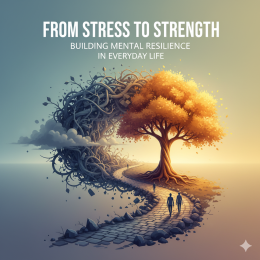
From Stress to Strength: Building Mental Resilience in Everyday Life
2025-10-17 17:08:59In the modern world, stress has quietly become a constant companion. Whether it's work deadlines, relationship issues, financial pressures, or digital overload, our minds are constantly juggling multiple demands. But here's the truth - stress doesn't have to control you. With the right tools, awareness, and mindset, you can turn daily challenges into opportunities for growth.
This process of adapting and bouncing back is called mental resilience - your brain's ability to recover from setbacks, cope with pressure, and keep moving forward. Just like muscles, resilience can be strengthened over time, helping you live a calmer, happier, and more balanced life.
In this blog, we'll explore what mental resilience truly means, why it's crucial for emotional health, and how you can transform stress into strength using science-backed, easy-to-follow strategies.
What Is Mental Resilience?
Mental resilience refers to your mind's natural ability to recover from difficulties, adapt to change, and find meaning even in adversity. It doesn't mean you don't feel pain, sadness, or fear - it means you don't let them define you.
Imagine resilience as your emotional shock absorber. When life hits hard, resilience cushions the impact and helps you regain stability faster.
In psychological terms, resilience involves:
Emotional regulation: Managing emotions during stressful events.
Cognitive flexibility: Adapting your thoughts and responses when facing problems.
Optimism and self-belief: Maintaining hope and confidence despite difficulties.
Why Building Mental Resilience Matters More Than Ever
We live in a time where burnout, anxiety, and depression are rising globally. The World Health Organization (WHO) identifies stress as one of the leading causes of modern health issues.
Developing resilience is not just about emotional stability it's about survival in an unpredictable world. Here's why it matters:
It helps you manage anxiety and depression effectively.
You learn to bounce back from failures faster.
It improves focus, decision-making, and productivity.
It supports better relationships and communication.
It protects against chronic stress and burnout.
When you cultivate mental resilience, you don't just survive tough times - you grow through them.
Recognizing the Signs of Stress and Mental Fatigue
The first step to building resilience is recognizing when stress starts taking control. Chronic stress often goes unnoticed until it turns into exhaustion, anxiety, or even physical illness.
Common Signs of Stress Overload:
Constant fatigue, even after rest.
Difficulty focusing or making decisions.
Mood swings, irritability, or emotional numbness.
Changes in sleep or appetite.
Feeling disconnected or unmotivated.
Headaches, body aches, or increased heart rate.
If these signs sound familiar, your body and mind may be signalling a need for mental rest and recovery.
How to Build Mental Resilience - Step by Step
Building resilience is a lifelong process - it's about adopting daily habits that nurture your mind and emotions. You don't need big changes; small, consistent efforts can create powerful results.
1. Practice Mindfulness and Meditation
Mindfulness helps calm your nervous system and builds awareness of your thoughts. Practicing even 10 minutes daily can reduce anxiety and improve focus.
Try mindful breathing, journaling, or guided meditation. Focus on being present, not perfect.
2. Reframe Negative Thoughts
Our thoughts create our emotions. Resilient individuals learn to challenge negative beliefs and replace them with empowering ones.
Instead of saying, I can't do this, say, I'll try and learn as I go. This shift builds confidence and self-trust.
3. Prioritize Rest and Quality Sleep
Sleep is a powerful healer. It restores your brain, balances hormones, and strengthens emotional regulation.
Set a regular sleep schedule, reduce screen time before bed, and create a peaceful environment.
4. Build Supportive Relationships
Strong social connections are vital for emotional well-being. Sharing your feelings with friends, family, or a counsellor helps release mental burden and strengthens emotional resilience.
5. Move Your Body - Stay Active
Exercise isn't just for fitness - it's one of the best natural antidepressants.
Physical activity releases endorphins, reduces cortisol, and enhances focus. Whether it's yoga, walking, dancing, or cycling - find what moves you.
6. Practice Self-Compassion
Many people are kind to others but harsh on themselves. Learn to treat yourself with the same empathy you offer a friend.
Accept that mistakes and setbacks are part of growth. Self-compassion helps you recover from stress without guilt or shame.
7. Seek Professional Help When Needed
There's no shame in asking for help. Speaking to a therapist, psychologist, or counsellor can help you process trauma, manage stress, and develop coping tools.
Professional guidance often turns emotional chaos into clarity.
Turning Stress into Strength
Resilience doesn't mean being unbreakable - it means being able to bend, adapt, and rise again.
Every challenge you face teaches your mind to stay calm, flexible, and wise.
Instead of fearing stress, learn from it. When you approach life's pressures as opportunities to grow, you naturally become stronger, calmer, and more self-aware.
The Role of Mental Health Awareness
Many people underestimate the importance of mental health until a crisis hits. Raising awareness about emotional well-being can encourage individuals to seek early support and prevent burnout.
At CIIMHANS, we emphasize that mental health is just as important as physical health.
Regular check-ins, therapy, community programs, and education can empower people to recognize their emotions, manage stress, and live more fulfilling lives.
Conclusion: Resilience Is a Daily Practice
Life will always have challenges - but your response defines your strength.
By practicing mindfulness, nurturing self-compassion, staying active, and building emotional awareness, you can turn every obstacle into an opportunity for growth.
At CIIMHANS, we believe that everyone can build mental resilience with the right support, awareness, and care.
Start small, stay consistent, and remember - every day you choose peace over panic, you're building strength from within.
